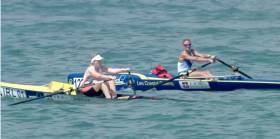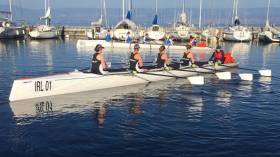Displaying items by tag: World Coastal Championships
Healy Best of Irish at World Coastal Rowing Championships
#Rowing: Ireland’s Sionna Healy placed seventh in the women’s solo at the World Coastal Championships in Hong Kong this morning. In tough, choppy, conditions, the Arklow woman clung on to sixth for most of a race which was won by Diana Dymchenko of Ukraine. Mette Petersen of Denmark finished fastest of the entire field and took sixth, while Castletownbere’s Miriam Sheehan also finished well to take eighth.
The best-placed men’s crews for Ireland were Myross, who took tenth in the men’s coxed quadruple, and Bantry’s Andrew Hurley, who was 13th in the men’s solo.
Belfast Boat Club’s women’s coxed quad took 11th in their A Final.
World Coastal Rowing Championships, Hong Kong – Day Three (Ireland crews)
Men
Quadruple coxed – A Final: 10 Myross 24 minutes 45.44 seconds. B Final (18th to 31st): 4 Galley Flash/Kilmacsimon 17:24.36.
Double – A Final: 13 Arklow (J Whooley, A Goodison) 27:01.10.
Solo – A Final: 13 Bantry (A Hurley) 30:52.53; 16 Galley Flash (J Harrington) 32.20.18.
Women
Quadruple, coxed – A Final: 11 Belfast BC 28:06.90; 15 Castletownbere/Myross (Ireland Two) 28:45.75.
Double – B Final (17th to 29th): 1 Castletownshend 20:46.01; 4 Arklow (Kinsella, Kinsella) 22:03.93, 5 Arklow (Jordan, Reid) 22:21.76.
Solo – A Final: 7 Arklow (S Healy) 32:45.91, 8 Castletownbere (M Sheehan) 32:53.20; 12 Arklow (X Jordan) 33:25.40; 14 Galley Flash (N Hayes) 34:03.40; 16 Arkow (MA Kent) 37:22.22.
Mixed
Double – B Final (17th to 32nd): 11 Kilmacsimon 21:04.85.
Ireland Women Qualify for A Finals at World Coastal Championships
#Rowing: Five Ireland entrants in the women’s solo single made it through heats into Sunday’s A Final of the World Coastal Rowing Championships in Hong Kong. Miriam Sheehan of Castletownbere placed best, taking third in the first heat, one place ahead of Sionna Healy. The Arklow sculler was one of three from her club to make it to the A Final in this class. Both women’s coxed quadruples, from Belfast and a composite of Castletownbere and Myross, also qualified for the A Final.
The Ireland men’s crews found the going tougher. Only the top five in the heats of the men’s double were guaranteed places in the A Final. John Whooley and Alan Goodison finished sixth in their heat - making it through. The three other Ireland crews missed out.
World Coastal Rowing Championships, Hong Kong – Day One, Heats (Ireland crews)
Men
Double (Five to A Final) – Heat One: 6 Arklow 19:04.39; 10 St Michael’s, Dublin 21:28.54.
Heat Three: 8 Kilmacsimon/Ring 21:15.37; 11 Courtmacsherry 22:53.45.
Women
Quadruple, coxed (Eight to A Final) – Heat One: 7 Belfast BC 19:33.28.
Heat Two: 7 Castletownbere/Myross 20:40.31.
Solo (Eight to Final) – Heat One: 3 Castletownbere (M Sheehan) 22:07.48; 4 Arklow (S Healy) 22:16.07; 7 Galley Flash (N Hayes) 23:13.68; 8 Arklow (MA Kent) 24:41.77.
Heat Two: 6 Arklow (X Jordan) 24:02.30.
Castletownbere Fly Flag for Ireland in A Final at World Coastal Rowing
#Rowing: Castletownbere, representing Ireland, finished 14th in the A Final of the women’s coxed quadruple at the World Coastal Rowing Championships in Thonon on Lake Geneva in France.
Greece won an exciting race, recovering from a mistake to take over the lead from Germany by the eighth buoy. Italy pushed into second, while Germany clung on to third. They held off Russia, who had led early in the race, by .36 of a second. Galley Flash won the B Final, and Cairndhu finished second.
Jessica Lee had finished second in the B Final of the women’s solo.
World Coastal Rowing Championships, Thonon, France, Day Two (Selected Results; Irish interest)
Women
Quadruple, Coxed – A Final: Greece (Nautical Club of Thessaloniki) 27 min 34.98, 2 Italy (CC Saturnia) 27:41.49, 3 Germany (Erster Kieler RC v 1862e V) 27:49.29; 14: Ireland (Castletownbere: E Hanley, C O’Regan, O Gilsenan, M Sheehan; cox: C Connolly) 30:42.58. B Final: 1 Ireland (Galley Flash) 20:46.06, 2 Ireland (Cairndhu) 20:56.34.
Solo – B Final: 2 Killorglin (J Lee) 23:39.30.































































